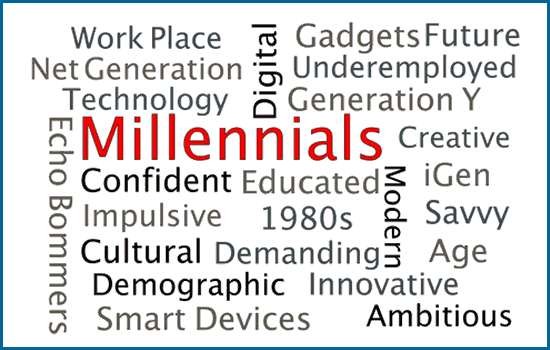For decades following WW2 baby boomers were the go-to demographic in the workplace. Everything evolved from understanding how to work with this majority age group, from the methods of communication to the official training styles of employees. Now, however, the demographic has shifted. Millennials in the workplace have officially taken that No. 1 slot in the workforce. Anticipate great changes regarding human resources’ operations in the near future.

Definition of a Millennial
People born from 1980 to 2000 are categorized as millennials. This age group encompasses the 18- to 34-year-olds taking over the job market. According to the Pew Research Center, as of May 2015 millennials in the workplace make up 34 percent of the American workforce, placing baby boomers at third place with 29 percent. Expect that number to only grow further and further apart thanks to the retirement of baby boomers and the improved job market placing millennials back in the office desk.
Workplace Differences: Millennials vs. Baby Boomers
Along with a title, this age cohort carries with it a great deal of challenges. For starters, millennials have an entirely different attitude compared to baby boomers when it comes to working. On one side of the ring you have baby boomers who are content with choosing a single career and employer, and staying put until they draw Social Security benefits. Not the case with millennials who, as noted by The Wall Street Journal, are restless. The median time for a millennial on a job? Sixteen months to three years, with the shorter amount of time belonging to the young ones among the millennials. Millennials are less willing to stick around if the workplace is not challenging, growing or beneficial to their professional goals.
Human Resource Changes with Millennials in the Workplace
In order to keep up with the times, human resource departments are going to need to ramp up their efforts. One such effort is in employee training. Training, whether dealing with a new hire or handling ongoing training, is one of the areas where maintaining millennials’ interests is made possible. By encouraging communication with training can help secure millennials with job satisfaction. Consider implementing various mentorship programs including reverse mentoring, as discussed by Forbes, as a way for millennials to teach while learning from baby boomers. Open up the training process to allow millennials in the workplace a chance to spread their professional wings. Your employee retention rates will benefit, in addition to your reputation as a company willing to keep up with the times.
Disclaimer Statement: All information presented is never intended as legal advice and is for information purposes only.





 In 2014, companies are searching for talent. Talent is the new currency of
In 2014, companies are searching for talent. Talent is the new currency of